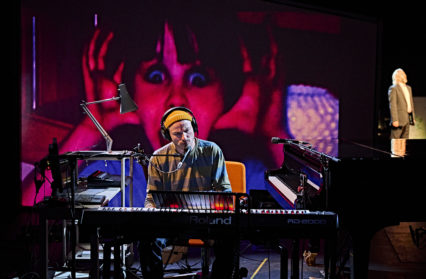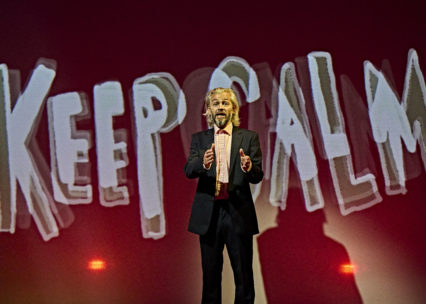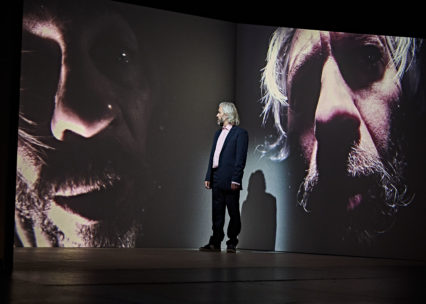Phil Morris reviews Shôn Dale-Jones’ new show, Possible, a National Theatre Wales production which blurs mediums in an attempt to tackle the themes of lockdown and pandemic.
It was perhaps unwise for Shôn Dale-Jones to open his new show Possible with a snippet from The Message by Grandmaster Flash, as four lines of the hip-hop polemic bristle with more intent and danger than this one-man multimedia live-streamed tale of the pandemic can muster over seventy-five minutes. To be fair, Dale-Jones doesn’t claim to do danger, as he states early on, his aim is to tell stories that deliver us “out of the troubles that trouble us”. With two jabs of vaccine promising everyone a return to normality beyond an oft deferred ‘freedom-day’ the inevitable question arises of “What the fuck just happened?” All humanity is staggering round, slow blinking at each other with the same expression of profound befuddlement at what we’ve endured over the past eighteen months, so it was not without interest that I looked to the creators of Possible for some answers. The show, however, disappoints on several counts, none more so that in its tired reiterations of familiar lockdown tropes including, worryingly ill parents, financial panic, manic baking, insomnia and infrequently changed underwear. I can get that over a beer with mates on Zoom and avoid the pretensions to genre-busting theatre-making made by NTW, who present the show with their typical technical wizardry and customary ability to state a platitude like it’s a revelation.
The production values are undeniably slick, digital animations and pieces of film created by Bear Thompson stitch together Dales-Jones’ warp and weft of multiple narratives with visual flair. NTW have often struck me as frustrated wannabe filmmakers rather than theatre artists, and Possible is no exception to their historical commitment to privileging visual spectacle over language and ideas. Someone should explain to them that snazzily executed back-projections aren’t a sufficient substitute for insight.
Dale-Jones has an engaging screen presence, not unlike a genial eighties children’s TV presenter, but his stories are much like his Mum’s celebrated midnight scones, comfort food with little in the way of nourishment. What’s the harm in that you might ask – aren’t we in need of comfort after all we’ve been through? Perhaps. Surely though, the universal experience of lockdown, loss and existential threat requires a response somewhat more enlightening than the observation that humans need to feel connected to each other and that the love of our families can help us to endure anything. This central message of Possible is undeniably true but it is nonetheless banal. A mobile phone company told me as much in its latest marketing email deposited in my inbox.
The various narrative strands of Dale-Jones’ recount the WhatsApp conversations between him and his siblings regarding adequate care for his elderly mother, who survives the pandemic through bloody-minded cussedness and home-cooking; while another story details the slow decline of his father-in-law who sadly succumbs to dementia. These stories represent a truth of the pandemic – that we’ve had to deal with filial love and sorrow inside and outside the confines of our various bubbles – but Possible doesn’t render this experience into art, it seems more like a podcast put on its feet with some accompanying slides. An aspect of the show that should have been explored at greater length and in greater depth, concerns the hazy and increasingly painful recollection of an incident of child sexual abuse that Dale-Jones experienced while at boarding school. He explains that, following attempts to self-heal from depression through meditation, he could “hear the past being pushed forward” and his mind “chatting” at him. The resurfacing of buried childhood trauma during the longueurs of lockdown is a potentially fascinating subject that might’ve provided ample material for an entire play. Shoehorned into a short running time of just over one hour, alongside competing narratives, this episode of trauma recovery is given too little space to yield the provocative and valuable insights that might have raised the show from its low-key, rather undercooked charm.
This is a substantial failure of dramaturgy that is even more unforgiveable given the inclusion of yet another narrative – a meta discourse on how Possible developed from an earlier pre-pandemic commission from NTW titled All About Love. Underlining the value of stories in our lives by regaling the story of how your own show came into being must’ve seemed like a clever idea at the time. It isn’t. Giving a cutesy shout-out to NTW artistic director Lorne Campbell, thanking him for putting the show into production is a post-modern joke without a punchline. It’s not that companies like NTW shouldn’t maintain support of their freelance collaborators and associates, that was a vital function to perform while theatres remained closed, it’s just that such self-referentiality smacks of smug self-satisfaction.
In the trailer for his show, Dale-Jones asserts that he and his team have created a hybrid form that fuses theatre with film, radio, music, and digital technology. It should be made clear that Possible offers contemporary audiences nothing new in terms of form. The films featuring American monologist Spalding Gray, most notably Swimming to Cambodia, worked in much the same way back in the late-nineteen eighties. Just because I can watch a show on my PC with a beer in hand and my own toilet conveniently placed a landing floor away from my seat doesn’t make for a satisfactory experience in and of itself. I look to the theatre to transform lived experience into art so that I might experience my life more intensely. Theatre (even digital live-streamed theatre) can do that by surprising and sometimes shocking me out of my complacency and prejudices, not with mere sensation but with intelligence and passion. Possible details how the parents of the middle aged have become burdensome responsibilities to their children, how the pandemic made artists acutely financially vulnerable and how child sex abuse creates a pernicious legacy, but it does so as an assemblage of journal entries not as poetry. Grandmaster Flash once warned us: ‘Don’t push me / Cause I’m close to the edge’ and I’m afraid that’s what Possible fatally lacks, an edge.
Possible is available on demand from 6 – 13 July. More information on tickets and the show can be found here.
Phil Morris is a regular contributor to Wales Arts Review.













